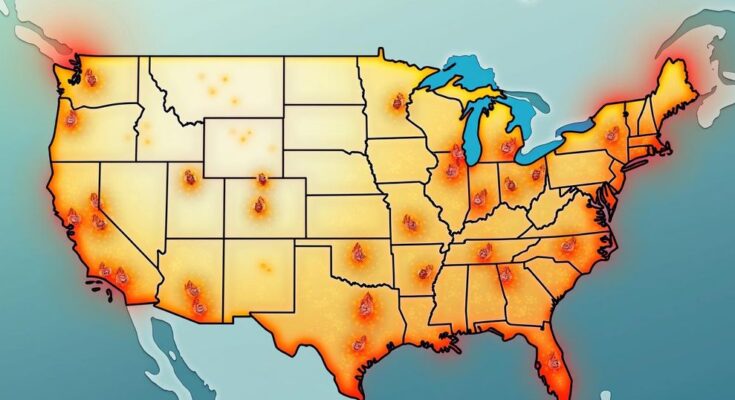On September 18, 2024, the Center for American Progress held a virtual conversation focused on policy measures to protect vulnerable populations from extreme heat and address pollution causing climate change. Keynote speaker Rep. Jennifer McClellan and a panel of experts discussed the profound impacts of extreme heat on communities, particularly children and marginalized groups, and emphasized the need for equitable and federal responses to combat the escalating climate crisis.
On September 18, 2024, the Center for American Progress convened a virtual discussion centered on the critical need for policy initiatives to safeguard vulnerable populations against the escalating threat of extreme heat. This event was particularly timely, as the summer of 2024 marked the second consecutive year of record-high global temperatures, underscoring the urgency of addressing the environmental challenges posed by climate change. During the keynote address, Representative Jennifer McClellan of Virginia articulated the devastating impact that extreme heat has on communities, notably emphasizing its effects on children. Rep. McClellan highlighted the pivotal role of the Inflation Reduction Act in combating climate change and addressing environmental injustices, while reiterating her personal commitment to the cause and the necessity of continuous efforts to mitigate pollution that contributes to climate change. Moderating a subsequent discussion, CAP Public Health Policy Director Jill Rosenthal engaged with an esteemed panel comprising Dr. John Balbus, the Director of the Office of Climate Change and Health Equity at the U.S. Department of Health and Human Services; Richmond Mayor Levar Stoney; Dr. David Michaels, an epidemiologist and public health professor at George Washington University; and the Rev. Terrance McKinley from the National Black Child Development Institute. Dr. Balbus underscored the necessity for a robust federal response to the extreme heat crisis. He endorsed federal initiatives, including the CDC’s HeatRisk tool, which assists businesses and local authorities in effectively planning for extreme heat scenarios. Dr. Balbus also detailed the Biden-Harris administration’s comprehensive national heat strategy, aimed at coordinating inter-agency responses and addressing deficiencies in planning, response, and resilience pertaining to extreme heat. The Rev. McKinley illuminated the disproportionate impact of extreme heat on Black and low-income communities, emphasizing the historical and systemic inequities that exacerbate heat risks. He advocated for equitable solutions that ensure all individuals have access to cooling resources, proper workplace protections, and enhanced healthcare availability. Mayor Stoney shared Richmond’s proactive approach in combating extreme heat through strategic investments in marginalized communities. Key initiatives include revitalizing the urban tree canopy, increasing green spaces, enhancing walkability to public areas, adopting reflective building materials, and reducing carbon footprints. Dr. Michaels drew attention to a proposed OSHA rule aimed at protecting workers from extreme heat, which he asserted could save lives and improve productivity. He noted the active role that state and local governments can play in establishing their own heat safety standards. In a poignant analogy, he compared the threats faced by workers during extreme heat to the heightened risks experienced in blue-collar jobs during the COVID-19 pandemic, where many lacked the autonomy to safeguard their well-being. The event concluded with remarks from CAP Public Health Policy Associate Director Marquisha Johns, who expressed gratitude to the speakers and informed attendees about CAP’s ongoing efforts addressing extreme heat, including a recently published report on maternal health and an anticipated brief on promoting cool and healthy living environments.
The discussion on extreme heat comes at a critical time, as climate change has led to unprecedented temperature rises, especially in recent years. With 2024 predicted to be the hottest year on record, it is imperative that dialogue around protective measures for vulnerable communities is prioritized. Vulnerable populations, particularly children and low-income communities, face greater risks from extreme heat and related health hazards. Current legislative initiatives, such as the Inflation Reduction Act, aim to alleviate these challenges by promoting environmental justice and reducing emissions that contribute to climate change. The combined efforts of federal agencies, state authorities, and local communities are essential to develop comprehensive strategies to manage the health implications of extreme heat.
In summary, the Center for American Progress event emphasized the urgent need for innovative policy responses to the challenges posed by extreme heat, especially for marginalized communities disproportionately affected by climate change. Key speakers highlighted the significance of federal resources, equitable solutions, and community-based strategies in mitigating heat risks. By fostering collaboration between public health officials, local governments, and community leaders, effective measures can be developed to protect the most vulnerable populations from the adverse effects of extreme heat.
Original Source: www.americanprogress.org




